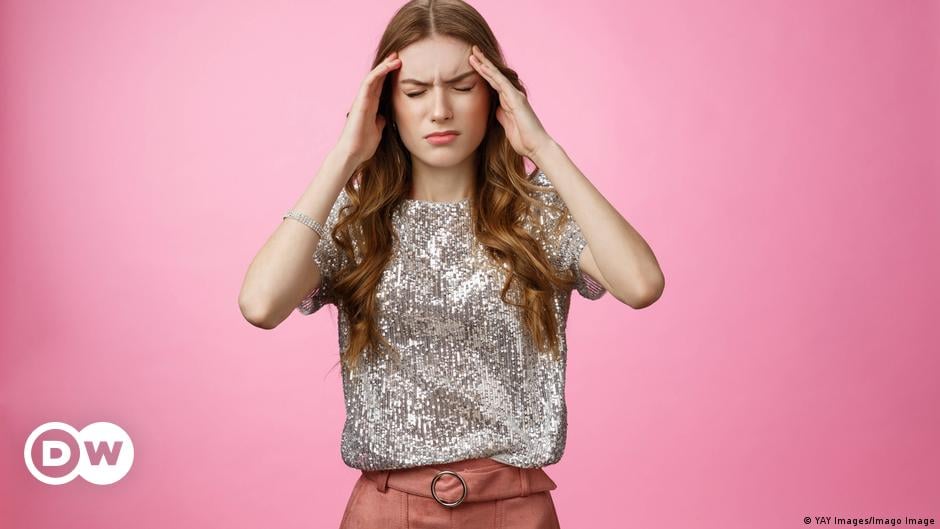Anyone who’s had a migraine knows how debilitating it can be. It begins with your head throbbing from the inside, the pain spreading like frozen iron from behind one eye to the next. You keep your head down, avoiding bright lights and loud sounds. Nausea begins to rise.
If you’re lucky you can retreat to bed before it gets any worse, where the migraine pins you down for anything between a few hours and a couple of days.
Migraine is not just a bad headache. It can debilitate you in ways that head pain cannot. For many, those with chronic migraine, more than half of your days each month are spent in this state.
One in two people suffer from a headache disorder, while around 15% of people globally suffer from migraines. Migraine is caused by a hypersensitive brain
Migraine is a disease of hypersensitivity: The migraine brain has abnormally sensitive neuronal connections.
Compared to people who don’t get migraines, this leaves migraineurs more likely to respond to small changes in the environment, which can result in headaches or more serious migraine attacks.
Migraine attacks are thought to originate from abnormal electrical excitability in sensory neurons in the meninges, layers of membrane that protect the brain.
When sensitized, these neurons send signals to the brain which trigger headache pain, photophobia, and other migraine symptoms. These neurons are also close to blood vessels, which is why headaches can feel like they pulse along with your heartbeat.
According to Paul Durham, a migraine researcher at Missouri State University, US, migraine is a disease which primarily affects the brain, but also involves the whole body.
“Other systems such as the immune, digestive and cardiovascular system contribute to migraine. That means if you only target one aspect of migraine with analgesics [pain-relief], then it is not likely to alleviate all symptoms and improve the patient’s quality of life,” he said.
What triggers migraine?
There are a huge range of migraine triggers and each person’s triggers can differ from the next. The most common triggers are:
- Bright lights and loud sounds.
- Strong smells like perfume, smoke, or certain smelly foods.
- Lack of sleep, poor quality sleep, or jet lag.
- Hunger or dehydration.
- Too much caffeine.
- Alcohol, especially red wine.
- Hormone fluctuations, such as before or during periods, pregnancy, or menopause.
- Foods and diet, especially diets containing ultra-processed foods and processed sugars.
- Stress.
Durham said that stress is the key binding factor here:
“These factors promote a hyperexcitable nervous system that is more susceptible to migraine triggers. Stress is a major factor in modern society,” he said.
Ways to help alleviate migraine symptoms
There are ways you can help to alleviate the severity of a migraine, or prevent a headache becoming a full-blown migraine.
Drinking plenty of fluids or placing an icepack on your forehead can help, as can resting in a quiet, dark room to ease environmental stressors.
Many patients learn to get migraine relief from cognitive behavioral therapy (CBT). It’s unlikely to treat the disease, but it can teach you thought actions to cope with pain and understand migraine triggers.
There are claims that mindfulness can also help, however studies are finding little evidence it has a robust impact on headache or migraine symptoms in the long run.
How do you treat migraine?
Here are some of the most clinically successful migraine medications:
- Calcitonin gene-related peptide (CGRP) monoclonal antibodies: These new migraine medications block the action of a protein called CGRP. CGRP plays an important role in the development of migraine symptoms, sensitizing neurons in the meninges.
- Triptans: A class of medications which bind to certain types of serotonin receptors in the body and causes pain-relieving effects.
- Analgesics like paracetamol or aspirin can be effective in reducing headache pain, but don’t tend to help reducing chronic migraine symptoms.
The evidence for CGRP antibodies and Triptans as migraine treatments is particularly robust, with patients having dramatic improvements of life quality after taking the drugs. However, the drugs don’t work in all patients, meaning not all patients can get migraine relief from medication.
Another issue is that treatments tend to focus on alleviating headache pain, which means other symptoms like nausea, light sensitivity and tiredness can remain.
Migraine treatments in development
Researchers are working hard to solve these treatment gaps and there are promising candidates being investigated:
- Neuromodulation devices: e-TNS (external trigeminal nerve stimulation) is a treatment which gives low power electrical stimulation to facial nerves. Clinical trials are showing clinical success in treating migraine, but it is not yet approved for patient use.
- Oxytocin: oxytocin hormonal nasal sprays could be effective and safe at reducing migraine incidence, especially in women.
- Certain foods or dietary supplementation treatments: Paul Durham’s research shows grape seed extract, cacao, or chicken broth can help reduce migraine incidence in some people.
"I don’t think nutraceuticals should ever replace medications, but they could provide another option for managing migraine. I like what Hippocrates said: ‘Let food by thy medicine’, " he said.
For the time being, these latest approaches have only been tested on small numbers of patients, meaning they currently lack sufficient evidence to be recommended to patients. However, all three candidates look promising, and clinical testing is underway to see if could be used as safe and effective migraine treatments.
In the trigger list you forgot quick weather changes (quick atmospheric pressure variation) and posture related issues that touch nerves.
I managed to alleviate the issue by working on triggers. I continously work on posture, I reduced the light related issues by recognizing which days or situation are at risk and using polarized sunglasses even indoor when necessary, finally I constantly work to reduce or handle stress. Unfortunately weather related trigger are very location specific. I started suffering only when I moved to the place I live now, because of the very volatile weather. I haven’t found a solution. I just recognize when it is happening and I take the migraine medicine asap. I realized my body is very good in weather forecasting.
Regarding food, for me is the opposite. Low sugar is a trigger. I recognize when I am low on sugar (blurry vision and lightening in the eyes), I immediately eat white sugar, and a croissant or something with quickly absorbed sugar. And it does wonders.
I can say that nowadays I am pretty happy to how I handle my migraines.
Edit. I forgot, dental bite does wonders for sleep issues, headaches and various triggers. Check with your dentist if you need one
If you need a more in depth read, I can recommend Oliver Sacks book on migraine, which shows how truly curious and multi-facetted the affliction is.
And also why there isn’t a single cure solution.
All of this is great. As a long time migraine sufferer I knew a lot of this already from experience but there are some great new tidbits here too. I want to mention one thing that works VERY well for me in case it might help someone else. I never see this mentioned but this almost always stops it dead for me.
Buy yourself a caffeine-Acetaminophen-Aspirin migraine medicine, regular over the counter generic brand is fine. If you’ve had more than a few you know how it feels right when they are starting to come on. Take the aforementioned migraine tablets as soon as you notice this.
Note this is in addition to the other preventative measures above and not a replacement for them. I find if I manage my daily life to mitiage the triggers, the meds will almost always stop any other flareups. But if I let it get too far along before taking the tablets they are useless.
I also find the caffeine-aspirin-tylenol (Excedrin) combination works for headaches, but not necessarily for my migraines. Usually I can tell the difference between my headaches and migraines and treat them as soon as I feel it and figure out which it is. If the Excedrin doesn’t work, I will dip into the triptan prescription but all of them give me a nasty side effect of stiff neck and just feeling weird, so I end up taking a muscle relaxer and lay down and nap in a cool, dark room until the effects and headache subside. I recently started taking the shot Emgality monthly as a preventative. So far it seems to work well with the only side effect being a mild localized reaction where the shot was (and the shot hurts like a @_&^#+!!!) But it goes away shortly. Hoping to avoid needing to use the triptan/muscle relaxer combo as it just steals my day(s) away.
Caffeine-paracetamol for me.
It’s funny, caffeine almost always has some effect on people’s migraines, either as a cure or a trigger. Unfortunately, most people think caffeine = coffee, and that’s really not the case. Coffee has a lot of other stuff in it…
Ibuprofen works well for me, luckily, and I typically carry a couple with me in my wallet. Before that I used paracetamol, until it was generally recommend to not use it, which also worked well. My migraines come rarely but if they come they’re usually pretty strong and sometimes can come back within the next few days too. Weirdly I never had a migraine aura until like a year or so ago.
For me, for migraines, ibuprofen is just slightly better than water. Paracetamol is not enough for most normal headaches.
It is not nice :D
How much do you take? Where I live you can’t get the higher dosed ones without a prescription but it’s not like there’s anyone stopping you from throwing 2 or 3 pills at once.
I had my first migraine over 40 years ago and have been a regular headache suffer for most of my adult life. I’ve mentioned it to my doctor more times than I care to remember, and last August I mentioned it again. He told me to stop taking pain killers, I said “really, are you completely insane, they’re the only thing that make most days manageable!”. Anyway, I did what I was told, and although September was tough, I can’t actually believe the results.
I keep a bullet journal, and have some personal data of reasonable quality. During August 2022 I had a headache on 28 days out of 31 and 2 migraines (both in the same week). During July 2023 I had 1 headache and no migraines.
In a routine NHS email a few months later, I spotted this article:
https://patient.info/news-and-features/can-taking-painkillers-actually-give-you-headaches
I attribute a lot of my headache free life to this advice, and I’ve saved a boatload of cash from not buying my weekly collection of pain killers.
As other people have commented, it’s a complex medical area, but if you’ve tried everything else and pop pills regularly, it might be worth a shot…
Migraine is a real bitch, and another nasty factor is that what works for someone, may make it worse for someone else.
I found that the only drug that helps me is Paracetamol with caffeine - Panadol Extra or similar ones. But I need to take it fairly early, otherwise there’s no help. Other than that, using a TENS/e-stim unit on back, neck or whatever gets stiff, is one of those lifesavers.






